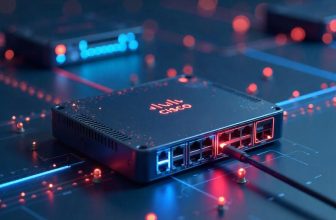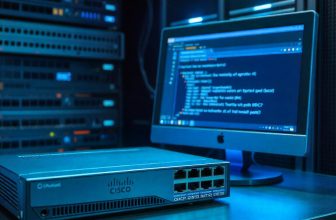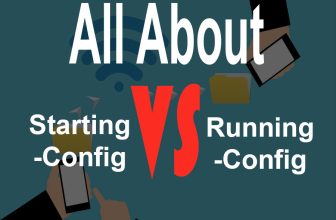
Cisco routers and switches operate using a structured mode-based system that determines what commands a user can access, based on their level of privilege. These devices primarily function through three core modes: User EXEC mode, Privileged EXEC mode (commonly referred to as Enable mode), and Global Configuration mode. Each mode serves a specific purpose in the management and configuration of the device.
When a user initially connects to a Cisco router or Cisco switch—whether through console access, SSH, or telnet, they begin in User EXEC mode. This is a limited access mode, mainly used for basic monitoring and troubleshooting tasks. Users can view the system status but cannot make any configuration changes.
To perform more advanced tasks, a user must enter Privileged EXEC mode by typing the enable command. This mode unlocks more powerful commands, such as viewing detailed system configurations, performing diagnostics, and accessing saved configurations. It’s often password-protected to prevent unauthorized changes.
For actual configuration changes, such as assigning IP addresses, configuring interfaces, setting up routing protocols, or defining VLANs, the user must enter Global Configuration mode. This is where network engineers define how the device operates within a network. It’s the core mode for modifying the running configuration and customizing the behavior of the router or switch to meet specific network requirements.
Understanding how these modes work together is essential for anyone working with Cisco devices. It ensures secure access control and allows for a structured approach to device configuration, making it easier to troubleshoot issues or scale the network as needed. Whether you’re a beginner or a seasoned professional, mastering these operational modes is fundamental to effective Cisco network management.
Router1> User EXEC Mode
User EXEC mode is the starting point when accessing a Cisco router or switch. It’s the default mode users enter immediately after logging into the device. At this level, the system grants limited, read-only access, which means you can view basic configuration settings and run simple diagnostic commands—but you can’t modify or save any settings.
This mode is designed for users who need visibility into the device’s status without the authority to make changes. For example, a support technician or a network observer might use User EXEC mode to check interface statuses or verify that a connection is live, without the risk of accidentally altering critical configurations. The command set in this mode is deliberately restricted to safeguard the system from unauthorized or unintended changes.
User EXEC mode plays an important role in maintaining network stability, especially in environments where multiple people may have access to network devices. By allowing basic monitoring without the ability to configure or disrupt, it helps enforce access control policies while still enabling necessary visibility. Understanding the purpose of this mode is crucial for anyone starting out with Cisco network devices, as it forms the foundation for navigating through more advanced configuration levels later on.
This mode allow users to run quite a few show commands which are as follows:
Command Description connect Open a terminal connection disable Turn off privileged commands disconnect Disconnect an existing network connection enable Turn on privileged commands exit Exit from the EXEC logout Exit from the EXEC ping Send echo messages resume Resume an active network connection show Show running system information ssh Open a secure shell client connection telnet Open a telnet connection terminal Set terminal line parameters traceroute Trace route to destination
Router1# Privileged exec mode / enable mode :
To access a more advanced set of commands on a Cisco router, you need to enter Privileged EXEC mode, also known as Enable mode. This is done by typing the command **enable** at the command prompt. For example, when you’re connected to a router named Router1, you would enter Router1> **enable** to switch modes.
Once the mode changes successfully, you’ll notice the prompt also changes. Instead of the greater-than symbol (>), you’ll now see a hash symbol (#) following the hostname, like Router1#. This symbol is an important visual cue that you’re no longer in basic User EXEC mode, but in Enable mode, which provides elevated access.
Privileged EXEC mode is essential for anyone who needs to do more than just monitor the router. From this level, you can run powerful diagnostic commands, view the full running configuration, and even enter configuration mode to make changes. It’s commonly used by network engineers and administrators when managing Cisco devices, as it provides the control needed for advanced troubleshooting and device setup.
Understanding this transition between user and privileged modes is a critical part of learning Cisco CLI navigation. It’s also an important step in securing network access, as this mode is typically protected by an additional password to prevent unauthorized users from making system-level changes.
Following is the list of commands you can enter in Privileged exe / enable mode:
Command Description auto Exec level Automation clear Reset functions clock Manage the system clock configure Enter configuration mode connect Open a terminal connection copy Copy from one file to another debug Debugging functions (see also ‘undebug‘) delete Delete a file dir List files on a filesystem disable Turn off privileged commands disconnect Disconnect an existing network connection enable Turn on privileged commands erase Erase a filesystem exit Exit from the EXEC logout Exit from the EXEC mkdir Create new directory more Display the contents of a file no Disable debugging information ping Send echo messages reload Halt and perform a cold restart resume Resume an active network connection rmdir Remove existing directory send Send a message to other tty lines setup Run the SETUP command facility show Show running system information ssh Open a secure shell client connection telnet Open a telnet connection terminal Set terminal line parameters traceroute Trace route to destination undebug Disable debugging functions (see also ‘debug‘) vlan Configure VLAN parameters write Write running configuration to memory, network, or terminal
Router1(config)# Global Configuration mode :
To begin making actual configuration changes on a Cisco router, you need to move beyond Privileged EXEC mode and enter Global Configuration Mode. This is done by typing the command **configure terminal** at the router prompt. For instance, if you’re working on a device named Router1, you would enter the command like this: Router1# configure terminal.
Once the command is executed, you’ll notice the prompt changes to include the word (config), appearing as Router1(config)#. This is a clear indication that you’ve successfully transitioned into Global Configuration Mode, the central area where most of the router’s configurations are applied.
This mode is where network administrators define how the router behaves, setting interface configurations, routing protocols, VLANs, access control lists, and much more. It’s the core of hands-on Cisco router and switch configuration. Entering Global Configuration Mode is like unlocking the control panel of the device; you now have the authority to shape its behavior according to your network requirements.
Being in this mode also means you need to be cautious. Any changes made here can significantly impact the router’s operation and the overall network. That’s why this mode is typically restricted to users with administrative privileges and a solid understanding of Cisco IOS commands.
Following is the list of commands that can be entered in Global Configuration Mode:
Command Description aaa Authentication, Authorization and Accounting access-list Add an access list entry banner Define a login banner boot Modify system boot parameters cdp Global CDP configuration subcommands class-map Configure Class Map clock Configure time-of-day clock config-register Define the configuration register crypto Encryption module do Run EXEC commands in configuration mode dot11 IEEE 802.11 configuration commands enable Modify enable password parameters end Exit from configuration mode exit Exit from configuration mode flow Global Flow configuration subcommands hostname Set system’s network name interface Select an interface to configure ip Global IP configuration subcommands ipv6 Global IPv6 configuration commands key Key management line Configure a terminal line logging Modify message logging facilities login Enable secure login checking mac-address-table Configure the MAC address table no Negate a command or reset it to default settings ntp Configure Network Time Protocol (NTP) parameter-map Parameter map configuration parser Configure parser settings policy-map Configure QoS Policy Map port-channel Configure EtherChannel priority-list Build a priority list privilege Set command privilege parameters queue-list Build a custom queue list radius-server Modify RADIUS query parameters router Enable a routing process secure Secure image and configuration archival settings security Infrastructure security configuration commands service Modify use of network-based services snmp-server Modify SNMP engine parameters spanning-tree Spanning Tree protocol configuration tacacs-server Modify TACACS query parameters username Establish user authentication credentials vpdn Virtual Private Dialup Network configuration vpdn-group Configure a VPDN group zone Firewall zoning configuration zone-pair Configure a security zone pair
If you are interested in cisco labs or preparing for CCNA bookmark this site and visit us for CCNA labs and cisco routers and switches configuration labs.






Hi,In which mode i can change configuration(such as IP address) of serial interface ?
Hi, Kindly help me ASAP, I want to change the IP address of fast ethernet port. Kindly let me know how do i get to interface configuration mode.